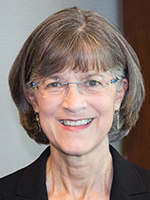Judge Catherine D. Perry
2016 American Inns of Court Professionalism Award for the Eighth Circuit
By Jennifer J. Salopek

 Although an early attempt to create an American Inn of Court in St. Louis, Missouri, foundered due to insufficient involvement, the second attempt was successful after careful planning and broad inclusion. Judge Catherine D. Perry, of the U.S. District Court for the Eastern District of Missouri, was engaged in the second effort. She explains the steps to success:
Although an early attempt to create an American Inn of Court in St. Louis, Missouri, foundered due to insufficient involvement, the second attempt was successful after careful planning and broad inclusion. Judge Catherine D. Perry, of the U.S. District Court for the Eastern District of Missouri, was engaged in the second effort. She explains the steps to success:
“I was contacted by a couple of lawyers and law professors who were interested in starting an Inn of Court,” she explains. “We wanted to be more strategic, so we got together for lunch and plotted it out. We enlisted a small group of people who would do the initial work, but tried to be as broad as we could in attracting members—not just the usual suspects (local lawyers who often appear in federal court), but state court practitioners also, including defenders and prosecutors. We worked hard to get a diverse practice mix in the Masters group.”
The Inn was chartered in 2009 and named for Theodore McMillian, the first African-American judge on the Eighth Circuit Court of Appeals. He was also a friend of Perry’s: “He was a wonderful person who supported many young lawyers and new judges, including me,” she says.
Perry thinks the need for American Inns of Court teachings and principles remains great. She witnesses unprofessional behavior from her perch on the bench. “Even for such basic things as discovery disputes, lawyers attack the other side with nasty e-mails and letters,” she says. “I have a real problem with the way they do it. They could achieve so much more by talking to one another directly. Both sides behave badly, and it’s so unprofessional.”
A native of Hobart, Oklahoma, Perry hails from a family of lawyers, each of whom earned their law degree on their own terms. Her father quit his agricultural job at the age of 30 to go to law school at the University of Oklahoma in Norman, while his wife taught school to support him and their four children. Perry’s mother later earned money by writing stories for true confessions magazines. Her father encouraged his daughters to go to law school, saying that the United States needed more women lawyers. Perry entered law school in 1977; her mother, two years later, at the age of 50.
The law exercised a particular attraction for women students in the late 1970s. Upon entering Washington University School of Law in 1977, the recipient of a scholarship for which she is “eternally grateful,” Perry found a first-year class that was 50 percent female, and several female law professors.
“It did not seem all that unusual, and the professors treated us all equally,” she says. Perry was active in the Women’s Law Caucus, elected to the Order of the Coif, and served as managing editor of the Washington University Law Quarterly.
Upon graduation, Perry joined the St. Louis firm of Armstrong, Teasdale, where she was the only woman and the first female partner. “I was often mistaken for the court reporter when I appeared at depositions,” she says. Due at least partly to Perry’s encouragement, the firm improved its hiring practices to gain more gender parity.
At Armstrong, Teasdale, Perry specialized in complex commercial litigation. Although some of her clients began to be sued for gender discrimination in the 1980s, she declined the opportunity to join that practice area. “I didn’t want that to become my specialty, and I loved the other business litigation I was doing,” she says.
Perry remained with the firm until she was appointed a magistrate judge in 1990. She was appointed a district judge by President Bill Clinton in 1994, and served as chief judge from 2009 to 2016. “I had not thought much about becoming a judge, but I when I learned there was an opening for a magistrate judge, I applied. I was thrilled to get the job and found it fascinating and very satisfying.”
To Perry, the key to being a good judge is simple: “First, love the law,” she says. However, “the practice of law is not as much fun at some of the larger law firms as it used to be, when firms were investing in your future. I hope the large law firms figure out a way to become more family-friendly.”
Through the McMillian Inn of Court and other venues, Perry loves to talk with young lawyers about what they do. “Many people don’t seem to understand how important professionalism and honesty really are. It’s important for young lawyers to see those who have become successful by following the rules. There is a lot of neglect lately in the practice of law, in client files, in responsiveness…
“There is a crying need for an organization like the American Inns of Court.”
Jennifer J. Salopek is a freelance writer based in McLean, Virginia.
© 2016 American Inns of Court. This article was originally published in the September/October 2016 issue of The Bencher, a bi-monthly publication of the American Inns of Court. This article, in full or in part, may not be copied, reprinted, distributed, or stored electronically in any form without the express written consent of the American Inns of Court.